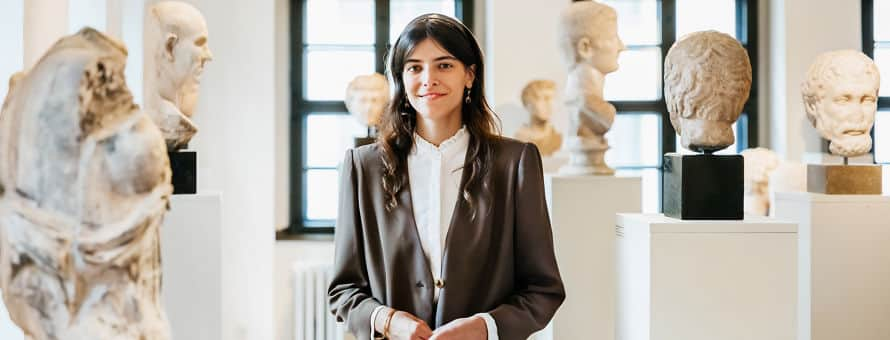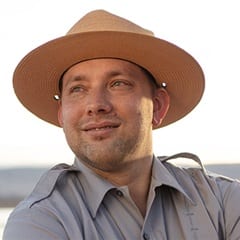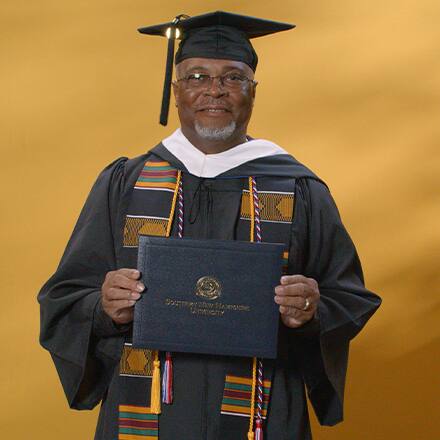Why is History Important?

For some, history is just that: Something to be learned in a classroom — a collection of names and stories in thick textbooks. But there are many reasons history is important well beyond a midterm exam in high school.

Everyone can benefit from historical knowledge because it explains humanity itself and the journey to the present day, according to Dr. Robert Denning, an associate dean of liberal arts at Southern New Hampshire University (SNHU). Denning is a modern American historian who engages with students through teaching and podcasts.
"History is the story of change over time. It also demonstrates that human nature has remained fairly constant," he said. "History demonstrates that circumstances and technologies change, but humans still want the same things that they wanted in previous civilizations: wealth, security, happiness, power, spiritual and social fulfillment, etc."
There are also people like John Roos '18 and Christian Renzi '22G, who used the study of history to transform their personal and professional lives.
Connecting With History
Renzi found his passion for history as a kid. Growing up in New England, he was surrounded by historical landmarks and stories of early America. His interest in history was sparked specifically by his dad, who Renzi said has read "every American history book on the planet."

Renzi took a trip to Gettysburg as a child, which he said deepened his interest in the Civil War — a topic he would later research while earning his master's degree in history with a concentration in American history at SNHU.
"History is incredibly important," he said. "Being able to say I have a master's degree is also very fulfilling to me. I have always loved to learn, and this program taught me a lot."
Like Renzi, Roos became interested in history at a young age, during a family trip to Gettysburg National Military Park in 1990.
"I saw the monuments, the ground the soldiers fought on, and National Park Service rangers giving tours on the battlefield," he said. "I knew that was what I wanted to do for a career at 10 years old.”
Despite initially pursuing a profession outside his passion, delivering packages for a startup company, Roos said his inner 10-year-old won out.
"I was making good money, actually, but I wasn’t happy," he said. "Deciding to go back to school was my wake-up call."

Roos earned his bachelor's degree in history with a concentration in American history at SNHU and entered the very environment that sparked his excitement 28 years before.
He began his career as a volunteer at a Revolutionary War park in New Jersey and gained more experience guiding tours at George Washington's Headquarters in Morristown, New Jersey.
Leveraging that experience, his degree and a pair of internships at historical sites, Roos landed a role as a full-time park guide at Fort Washington Park outside Washington D.C.
"I wound up being qualified to give tours at all four battlefields, both historic homes and multiple special events," he said. "I wanted and did gain so much knowledge from this park that it has become my focus to land a permanent position there."
Park guide is just one of many roles a background in history can prepare you for.

Why is Taking History Important?
Like Roos, many with a zeal for history earn a degree in the subject or a related field prior to heading into the professional world.

Take, for instance, Dr. Matthew Schandler, an adjunct history instructor and academic partner at SNHU with nearly a decade of experience teaching political science. Schandler had a particular interest in intellectual history and the history of philosophy during his studies.
"Given the overlaps with political theory and political science, I began teaching and working in the social sciences," he said. He also followed a thread into the artificial intelligence (AI) realm, applying his history background to a topic that's dominating headlines today.
"Since I had studied the history of AI, I understood its foundational building blocks," he said. "So, I also became more adept with quantitative applications, including those related to data science and analytics."
History has given Schandler the ability to shape his career around subjects that interest him — a perk of the history degree. Whether your goal is to become a historian or you're taking history courses to fulfill general education requirements, the foundations and skills you can gain while studying history can be useful in a variety of fields.
According to Schandler, some of these fields include:
- Education
- Healthcare
- Humanities
- Law
- Science
"Given our varied interests and backgrounds, what we study in school can prepare us for careers in many related areas," he said. "Everything, both animate and inanimate, has some sort of history associated with it."
When studying history, in particular, you have the chance to develop your traditional and digital literacy skills as well as an ability to work with qualitative and quantitative information, according to Schandler.
"Between the papers and the discussion board posts, I became a much better writer and researcher," Renzi said.
And so, with roots in history, the future really is yours for the making.
Find Your Program
How Can You Apply History in Your Daily Life?
It might feel counterintuitive, but history can help you make sense of the present day and current events. "A student of the past understands the present more comprehensively," Schandler said.
A historical perspective can better equip you to navigate challenging conversations, too. "Being conversant in the past allows one to engage with others in a dialogue," Schandler said. "If we can continue to build upon simple conversations, we can reach deeper, shared outlooks. In turn, this could lessen conflict and polarization."
Denning, who has a bachelor's, master's and doctorate degree in history, said his background has positively impacted his current relationships.
"Knowledge of the past, and how past events affected people differently, can create empathy in the present for other people in different social or financial classes and groups, whose history may differ from the mainstream," said Denning.
Renzi reflected on history's impact on his personal growth. "I also think learning about the history of different cultures and peoples can make you a more empathetic person and a more well-rounded person," Renzi said.
Moreover, Denning said history is important because it encompasses every other field of human knowledge.
"There is a history behind math, economics, biology, engineering, etc.," he said. "None of those fields developed in a vacuum. All of those fields developed within broader political, social, cultural and religious contexts and were influenced by those contexts."
However, learning from history begins with avoiding cliches such as “history repeats itself” and “those who ignore history are condemned to repeat it," said Denning.
"Historians don’t believe that,” he said. "In very rare situations, we believe that knowledge of the past can tell us what to do or what to avoid in the present, but circumstances are rarely similar enough to have an exact analogy from the past. Instead, we believe that a thorough understanding of the past will help present leaders make informed decisions based on all available data.”
What History Can Teach You
Due to the nature of Roos' job, he'd meet many people who have varying, and often strong, viewpoints on historical figures, events and politics. That experience led him to recognize that history has many layers and is rarely black and white.
"It tells us that what we do today is not as simple as one thing," he said.
Roos explained, for instance, that often a historic military leader may be judged for winning or losing a battle without consideration of extenuating circumstances, such as political pressures and other factors, a reality that caused Roos to change his college thesis, as well as the way he viewed both past and present events.
"Layers grow from seeing that historical moment came about because of this, this and that, and the aftereffect was that, that and this," he said. "It is not one moment. It is a series of moments that shapes what happened, where we are today and where we are going.”
Discover more about SNHU's online history degree: Find out what courses you'll take, skills you'll learn and how to request information about the program.
Ryan O'Connor works in higher education marketing at Southern New Hampshire University. Connect with him on LinkedIn.
Explore more content like this article

Why is Poetry Important? Celebrating National Poetry Month

Meet Betty White Stamp Artist Dale Stephanos, SNHU Graphic Design Grad

SNHU Spotlight: Dennis Peacock, BA in Graphic Design Grad
About Southern New Hampshire University

SNHU is a nonprofit, accredited university with a mission to make high-quality education more accessible and affordable for everyone.
Founded in 1932, and online since 1995, we’ve helped countless students reach their goals with flexible, career-focused programs. Our 300-acre campus in Manchester, NH is home to over 3,000 students, and we serve over 135,000 students online. Visit our about SNHU page to learn more about our mission, accreditations, leadership team, national recognitions and awards.

